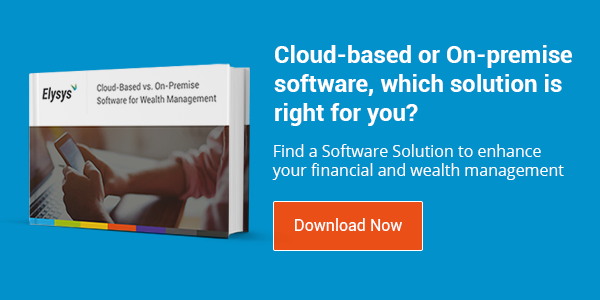Is the Cloud Secure Enough for Wealth Management?
Cloud-based computing is hot news in the financial sector with an increasing number of firms and major global banks streamlining their operations by moving to the Cloud. However, if you are the CEO of a Family Office or a High Net Worth Individual dealing with sensitive personal and financial data; the idea of virtual data storage and computing could be disconcerting.
Perhaps you're facing questions like:
How safe is my data from prying eyes and greedy fingers?
How can I be sure that boundaries will be maintained between my data and that of others?
Here's what you need to know about cyber-security and Cloud-based wealth management applications...
How to Evaluate the Security of a Data Centre
Whether you are evaluating a Private Cloud option or an On-premise application, here are a few helpful questions to ask to determine the security of a proposed computing and data storage solution:
- Is the data centre equipped with redundant heating ventilation, air conditioning (HVAC) systems and advanced fire suppression systems?
- Which physical security measures have been put in place to keep intruders out of the data centre?
- Data isolation - how is the data of one client, or family, isolated and safeguarded from others?
- Is the system protected from viruses and hackers by best-in-class firewalls?
- What protocols are in place to secure access control to data?
- Is a signed audit trail kept to log when tasks are performed, by which users, and when?
- What data encryption philosophy is followed, and how exactly is data encrypted?
- Power supply – does the data centre have uninterruptable power supplies (UPSs) and backup generators in place?
- Is redundancy protocols deployed across the entire network?
- Do the infrastructure and the processes fulfil the compliance standards of your industry?
- Does the system provide for disaster recovery solutions?
Do It Yourself Data Storage?
With best-of-class Cloud-based Solutions coming equipped with the infrastructure and processes that ensure uptime and the highest level of security, it will be difficult for stand-alone organisations to compete.
From extreme physical security measures, uninterruptable power supplies, HVAC level air conditioning and advanced fire suppression systems and a highly skilled IT team – setting up and maintaining a state of the art data centre requires an extensive investment in infrastructure and staff to ensure security and uptime.
Stand-alone organisations and individuals, often do not have the resources to enable an on-premise solution that meets security demands, which makes the shared data centre of the Cloud-based model a lucrative option.
And, rest assured, Cloud Security is about to become even more stringent; With the European Union’s new Data Storage Regulation that is to come into effect at the beginning of 2018, Cloud users will be able to claim compensation from providers in the case of loss or leakage of data as result of unlawful processing. The implication of this regulation, European Union, Directive 95/46/EC, will necessarily be that Cloud providers will be taking even stronger measures to ensure the security and privacy of their clients’ data.
The Private Cloud Option
For Wealth Managers who are concerned with the security of Public Cloud Solutions, Private Cloud is an option to consider.
Private Cloud is much the same as Public Cloud, with the key differentiator that the hardware and software deployed is dedicated to the sole use of a particular organisation. It still makes use of multiple virtual machines across a server and data storage centre, but in this instance it can be managed by the client or outsourced to a Cloud Computing provider. On top of that, it could be located on-premise or hosted within a third party’s data centre.
There are 4 common combinations that Private Cloud follows:
- Off-premise, managed by a third party
- On-premise, managed by a third party
- Off-premise, managed by the client
- On-premise, managed by the client
An off-premise, third party managed solution would be the combination to achieve optimal business results, considering the key benefits associated with a move to the Cloud, which are to:
- lower the level of operations management that the business must perform on the infrastructure, and
- lower the amount of capital expenditure needed to set-up the infrastructure.
Cloud-based vs. On-premise Solutions
Are you undecided between an On-premise Solution and Cloud-based software for your Wealth Management? Get more information about these two options by downloading our FREE eBook now.
